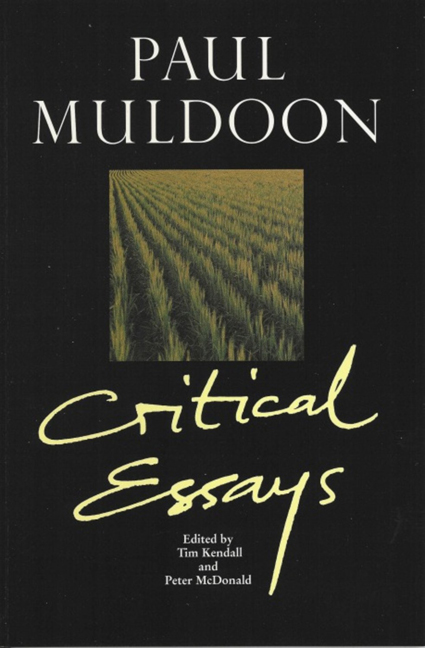Book contents
- Frontmatter
- Contents
- Acknowledgements
- Notes on Contributors
- Introduction
- ‘Thirteen or Fourteen’: Paul Muldoon's Poetics of Adolescence
- Never Quite Showing his Hand: Robert Frost and Paul Muldoon
- For Father Read Mother: Muldoon's Antecedents
- Pax Hibernica/Pax Americana: Rhyme and Reconciliation in Muldoon
- Muldoon and Pragmatism
- ‘All That’: Muldoon and the Vanity of Interpretation
- Paul Muldoon's Transits: Muddling Through after Madoc
- ‘All Art is a Collaboration’: Paul Muldoon as Librettist
- Muldoon's Remains
- Index
‘All Art is a Collaboration’: Paul Muldoon as Librettist
- Frontmatter
- Contents
- Acknowledgements
- Notes on Contributors
- Introduction
- ‘Thirteen or Fourteen’: Paul Muldoon's Poetics of Adolescence
- Never Quite Showing his Hand: Robert Frost and Paul Muldoon
- For Father Read Mother: Muldoon's Antecedents
- Pax Hibernica/Pax Americana: Rhyme and Reconciliation in Muldoon
- Muldoon and Pragmatism
- ‘All That’: Muldoon and the Vanity of Interpretation
- Paul Muldoon's Transits: Muddling Through after Madoc
- ‘All Art is a Collaboration’: Paul Muldoon as Librettist
- Muldoon's Remains
- Index
Summary
‘All art is a collaboration’, writes John Millington Synge in his preface to The Playboy of the Western World. Although a trained musician, one form of collaborative art the playwright and poet never explored was opera. His colleague in the Irish Literary Revival, the notoriously tone-deaf W.B. Yeats, was no more enthusiastic. Writing as one who ‘cannot tell one tune from another’ in his essay ‘Speaking to the Psaltery’, Yeats remembers his youthful impatience with setting poetry to music:
when I heard anything sung I did not hear the words, or if I did their natural pronunciation was altered and their natural music was altered, or it drowned in another music which I did not understand. What was the good of writing a love-song if the singer pronounced love ‘lo-o-o-o-o-v-e’.
Samuel Beckett could not abide opera either. Writing on music in his 1931 monograph Proust, he declared that ‘by definition, opera is a hideous corruption of this most immaterial of all the arts: the words of a libretto are to the musical phrase that they particularize what the Vendôme Column, for example, is to the ideal perpendicular’. The great exception to all this is James Joyce, a passionate amateur tenor given to accompanying himself on the guitar or an out-of-tune piano to a favourite Massenet aria, but after the musical tour de force of the ‘Sirens’ chapters of Ulysses he professed himself disillusioned: ‘I, the great friend of music, can no longer listen to it. I see through all the tricks and can't enjoy it any more.’
The precedents for Paul Muldoon's ventures into libretto-writing would not seem encouraging, in an Irish context at least. Beyond that, even so prolific a librettist as W.H. Auden has only words of caution: ‘if the librettist is a practising poet,’ he writes, ‘the most difficult problem, the place where he is most likely to go astray, is the composition of the verse.’ A confirmed non-librettist, Philip Larkin had an uncharitable explanation for the popularity of his juvenilia with composers: ‘musicians don't like things that mean too much’. However good or bad their musical settings, poems continue to have an existence in their own right, which is more than can be said of most libretti.
- Type
- Chapter
- Information
- Paul MuldoonCritical Essays, pp. 150 - 169Publisher: Liverpool University PressPrint publication year: 2004



